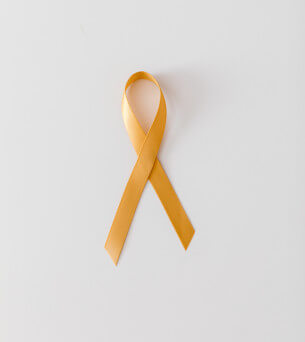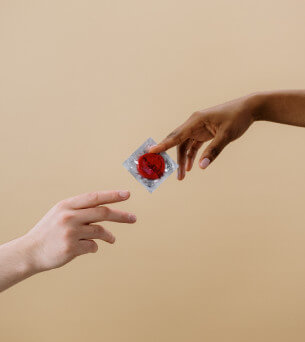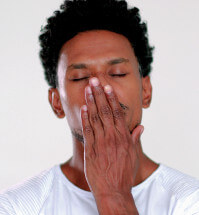Jaarlijks laten zich meer dan 100.000 mensen testen op een soa. In Nederland is de meest voorkomende soa chlamydia, maar daarnaast komen gonorroe, herpes genitalis, genitale wratten, syfilis en HIV ook frequent voor. Niet alle soa’s geven klachten en vaak zijn de symptomen verschillend voor mannen en vrouwen. Sommige soa’s geven geen klachten, terwijl ze wel schade aan je gezondheid kunnen richten. Het is daarom verstandig om je frequent te testen op soa’s als je seksueel actief bent, ook wanneer je geen klachten ervaart. Soa’s zijn namelijk goed te behandelen, mits je er snel bij bent. In dit artikel worden de meest voorkomende soa’s besproken, of zij symptomen geven en zo ja, welke dit zijn en welke verschijnselen deze soa’s aan zowel mannen als vrouwen geven.

Wat is een soa en hoe krijg je het?
Een soa staat voor seksueel overdraagbare aandoening. Een soa is een infectie met een bacterie, virus of parasiet die je oploopt via seksueel contact. Het wordt overgedragen via lichaamsvocht, zoals sperma, vaginaal vocht of bloed. De meeste soa’s worden vervolgens opgenomen via slijmvliezen, dit zijn de vochtige delen van de huid, zoals je mond, keel, penis, vagina of anus. Andere soa’s worden overgedragen en opgenomen via het bloed. Enkele soa’s kun je oplopen door huid-op-huid-contact.


Hoe herken je een soa?
EEen soa geeft niet altijd soa klachten. Sommige mensen hebben dus een soa zonder dat ze het merken. Bovendien geeft iedere soa ook weer andere soa klachten én kunnen deze soa klachten ook nog eens verschillen per geslacht. Veelvoorkomende klachten van een soa, zoals veranderde afscheiding, pijn of branderigheid bij het plassen of huidplekjes kunnen ook wijzen op een andere aandoening. Omdat het herkennen van een soa dus lastig is, is het belangrijk om je regelmatig te laten testen als je seksueel actief bent. Bovendien kunnen soa’s vervelende gevolgen hebben voor je gezondheid wanneer je ze niet op tijd behandelt. Soa-testen kan je eenvoudig en helemaal anoniem laten afnemen middels onze soa thuistesten.
SOA Symptomen
Een soa geeft dus niet altijd symptomen. En hoe snel je soa klachten ontwikkelt, hangt af van het type soa. Hieronder volgt een lijst met soa klachten die zowel mannen als vrouwen bij verschillende soa’s ervaren. Ook wordt er een indicatie gegeven over de incubatietijd, dit is de tijd tussen het onbeschermde seksuele contact en het ontwikkelen van soa verschijnselen.
Chlamydia symptomen
Dit is de meest voorkomende soa in Nederland. Het komt voornamelijk voor bij jonge, seksueel actieve mensen, zowel bij mannen als vrouwen, heteroseksueel en homoseksueel. Je loopt chlamydia op door direct contact te hebben met slijmvliezen van iemand die chlamydia heeft, bijvoorbeeld via slijmvliezen van de vagina, penis of anus. Wanneer je seks hebt met iemand met chlamydia is de kans 10% dat je ook chlamydia krijgt. Deze kans is iets lager wanneer je orale seks hebt met iemand met chlamydia. De incubatietijd is een tot drie weken. Indien chlamydia bij vrouwen onbehandeld blijft kan het een ontsteking in de onderbuik geven en een minimaal verhoogd risico geven op vruchtbaarheidsproblemen. Bij mannen kan onbehandelde chlamydia een ontsteking geven bij de bijbal of van de prostaat.



Chlamydia verloopt grotendeels zonder symptomen; slechts 10% van de vrouwen en 50% van de mannen ervaart klachten wanneer zij besmet zijn met chlamydia.
Chlamydia symptomen vrouwen:
- Meer of veranderde vaginale afscheiding.
- Pijn bij het plassen.
- Pijn in de onderbuik.
- Vaginaal bloedverlies tussen de menstruaties door.
- Vaginaal bloedverlies na seksueel contact.
- Bloed en/of slijm bij de ontlasting.
- Jeuk en/of irritatie bij de anus.
Chlamydia symptomen mannen:
- Pijn of branderig gevoel bij het plassen.
- Afscheiding uit de plasbuis, met name in de ochtend.
- Pijn aan de balzak.
- Bloed en/of slijm bij de ontlasting.
- Jeuk en/of irritatie bij de anus.
Gonorroe symptomen
Gonorroe komt vaker voor onder mannen die seks hebben met mannen, maar ook onder heteroseksuelen komt deze infectie nog frequent voor. Gonorroe wordt overgedragen via contact tussen slijmvliezen, oraal, anaal of vaginaal. Wanneer je seks hebt met iemand die gonorroe heeft, is de kans 50-80% dat je ook gonorroe krijgt. De incubatietijd van gonorroe is twee dagen tot twee weken, maar gemiddeld acht dagen. Indien gonorroe niet behandeld wordt, geeft het een verhoogde kans op ontsteking in de buik, gewrichtsontstekingen en oogontstekingen.


Gonorroe kan asymptomatisch verlopen bij beide geslachten, maar veroorzaakt doorgaans vaker de volgende symptomen:
Gonorroe symptomen vrouwen:
- Pijn of branderigheid bij het plassen.
- Pijn tijdens seksueel contact.
- Bloedverlies na of tijdens seksueel contact.
- Veranderde afscheiding, vaak geel-groen van kleur en onaangenaam ruikend.
- Keelpijn.
Gonorroe symptomen mannen:
- Pijn of branderigheid bij het plassen.
- Geel-groene afscheiding uit de plasbuis.
- Keelpijn.
- Pijn bij anus.
- Bloed of slijm bij ontlasting.
Genitale wratten symptomen
Genitale wratten worden veroorzaakt door een bepaald type van het humaan papillomavirus. Het virus wordt overgedragen via seksueel contact, maar kan ook overgedragen worden via handen of materialen. Ook wanneer je geen klachten hebt, kan je het virus overdragen. De incubatietijd ligt tussen een en acht maanden, maar is gemiddeld drie maanden.
Symptomen zijn voor mannen en vrouwen gelijk:
- Typische roze of witte wratten in het genitale gebied met een bobbelig oppervlak, zoals een bloemkool.
- Soms gaan de wratten gepaard met jeuk of een branderig gevoel.
Herpes genitalis symptomen
Je kunt herpes genitalis krijgen door anaal, oraal of genitaal contact. Ook wanneer iemand op dat moment geen klachten of huidafwijkingen heeft, kan herpes genitalis worden overgedragen. Wanneer je besmet raakt met herpes genitalis, blijft het virus na de besmetting in je lichaam. Het kan dan op een later moment weer klachten veroorzaken. Vrouwen hebben meer kans om herpes genitalis op te lopen. De incubatietijd is twee tot 12 dagen.
Herpes genitalis symptomen:
Wanneer je de eerst keer besmet raakt met herpes genitalis ontwikkel je meer ernstige soa verschijnselen dan wanneer je een recidief hebt. Bij de eerste infectie is er sprake van algehele malaise, koorts en spierpijn. Vrouwen hebben daarnaast ook last van heftige pijn in het genitale gebied, pijn bij het plassen, veranderde afscheiding en vergrote lymfeklieren. Mannen hebben tevens pijn of branderigheid bij het plassen. Na ongeveer een week ontwikkelen bij beide geslachten dezelfde huidafwijkingen in het genitale gebied:
- Blaasjes gevuld met vocht, welke zeer pijnlijk zijn.
- Deze blaasjes gaan uiteindelijk kapot, waarna zweertjes en wondjes ontstaan. In deze fase ben je het meest besmettelijk. Deze blijven ongeveer drie weken bestaan.
Na de eerste infectie blijft het virus in slapende vorm in je lichaam aanwezig. Wanneer je afweer een periode iets minder functioneert, bijvoorbeeld doordat je ziek bent, gestresst bent of medicatie gebruikt, kan het virus weer actief worden en de klachten weer terugkomen. Vaak verloopt zo’n recidief een stuk milder dan de eerste infectie.
Gerelateerde tests


Syfilis symptomen
95% van de besmettingen met syfilis vindt plaats bij mannen die seks hebben met mannen, 5% van de besmettingen vindt plaats bij heteroseksuele relaties. Syfilis komt steeds vaker voor. Syfilis wordt overgedragen via oraal, anaal of genitaal seksueel contact, waarbij er direct contact is met de huidafwijkingen die bij syfilis horen. De incubatietijd kan sterk variëren en ligt ergens tussen tien en 90 dagen.




Als je besmet raakt met syfilis doorloop je verschillende stadia, welke steeds meer ernstige soa verschijnselen geven wanneer je syfilis onbehandeld laat. Vooral de eerste stadia kunnen nog zonder soa klachten verlopen bij beide geslachten.
De symptomen van syfilis zijn voor mannen en vrouwen gelijk:
- Stadium 1: rood, hard plekje/zweertje op penis, vagina, anus of mond. Soms kan je dit plekje niet goed zien. Dit plekje gaat vanzelf weer weg.
- Stadium 2: vervolgens krijg je algemene lichamelijke klachten, zoals koorts, hoofdpijn, vergrote lymfeklieren en huidafwijkingen. Ook deze klachten gaan vanzelf weer weg.
- Stadium 3: wanneer syfilis onbehandeld blijft, kan het in dit stadium ernstige soa klachten geven, welke nog kunnen beginnen tot 30 jaar na het onbeschermde seksuele contact. Dit noem je orgaansyfilis en is een ernstige medische aandoening. Het kan zeer uiteenlopende klachten geven aan hart, hersenen, botten en huid. Ook kunnen er ontstekingen ontstaan in vrijwel alle organen.
HIV symptomen
Er worden jaarlijks in Nederland nog honderden nieuwe HIV-diagnoses gesteld. HIV wordt met name gediagnosticeerd bij mannen die seks hebben met mannen en heteroseksuele mensen die seks hebben met iemand uit een gebied waar veel HIV voorkomt. Het HIV virus bevindt zich in bloed, sperma, vaginaal vocht en moedermelk. Je loopt HIV op wanneer jouw bloed in contact komt met een van deze vloeistoffen, kan je HIV oplopen. De kans dat je HIV krijgt als je seks hebt met iemand met HIV is afhankelijk van de viral load van degene met HIV, dit is de hoeveelheid virus in het bloed van iemand met HIV. Indien iemand niet behandeld wordt voor HIV, is de viral load hoog en is er een hogere besmettingskans.


HIV symptomen zijn voor mannen en vrouwen gelijk:
- Twee tot vier weken na de besmetting ontstaan griepachtige verschijnselen, zoals koorts, algehele malaise met daarbij een huiduitslag. Deze fase gaat vanzelf over.
- Daarna volgt een fase zonder verschijnselen van een soa, deze fase kan wel tot tien jaar duren. In deze periode gaat het afweersysteem steeds verder achteruit.
- Wanneer HIV niet behandeld wordt, zal het afweersysteem dusdanig achteruit gaan dat er AIDS ontstaat. AIDS geeft een scala aan klachten en ziektebeelden en is uiteindelijk (onbehandeld) dodelijk.
Trichomonas symptomen
Trichomonas is een soa die in Nederland niet vaak voorkomt. Als je seks hebt met iemand met trichomonas is de kans heel groot dat je ook trichomonas krijgt. De incubatietijd van trichomonas is een tot vier weken.

Trichomonas bij vrouwen:
- Jeuk en/of irritatie aan de vagina.
- Andere afscheiding, vaak groen-geel van kleur met belletjes erin.
- Rode vaginawand.
Trichomonas bij mannen:
- Bij mannen kan de infectie zonder symptomen verlopen.
- Branderig gevoel en/of pijn bij het plassen.
Andere aandoeningen waar je een risico op hebt door seksueel contact
Er zijn enkele aandoeningen die officieel niet tot de soa’s worden gerekend, omdat ze voornamelijk via andere wegen worden overgedragen, maar waar je wel een grotere kans op hebt wanneer je seksueel contact hebt.
Schurft
Schurft is een aandoening die wordt veroorzaakt door de schurftmijt. Wanneer je gedurende langere tijd huid-op-huid-contact hebt gehad met iemand met schurft, kan je ook schurft krijgen. Schurft wordt gekenmerkt door hevige jeuk, schilferende gangetjes en blaasjes en pukkeltjes. Uitgebreide informatie kan je vinden op ons aparte blog over schurft.
Schurft kan je ook apart testen via PCR Schurft test.
Candida
Candida is een schimmelinfectie. Veel vrouwen dragen deze schimmel bij zich zonder dat ze daar klachten van hebben. Candida veroorzaakt namelijk alleen klachten wanneer er sprake is van een overmatige groei, bijvoorbeeld door het gebruik van zeep of door het te lang inhouden van een tampon. Tijdens seksueel contact kan je de schimmel overdragen. Het is alleen nodig om candida te behandelen wanneer je klachten ervaart. De incubatietijd is een tot twee dagen.
Candida symptomen vrouwen:
- Jeuk in de vagina.
- Brokkelige afscheiding uit de vagina.
- Soms stinkt de afscheiding.
- De binnenkant van de vagina kan roder en meer opgezwollen zijn en kan branderig aanvoelen.
- Pijn en/of een branderig gevoel bij het plassen.
Candida symptomen mannen:
- Roodheid, schilfering en vlekjes aan eikel of penis.
- Jeuk aan eikel of penis.
- Pijn en/of een branderig gevoel bij het plassen.



Bacteriële vaginose
Bacteriële vaginose wordt veroorzaakt door de bacterie gardnerella vaginalis. Deze bacterie vormt bij veel vrouwen onderdeel van de normale vaginale flora. Wanneer er echter een verstoring is van het evenwicht van deze flora, kan de bacterie gaan overgroeien en klachten geven. Je hebt meer kans op verstoring van dit evenwicht door bepaalde typen glijmiddel te gebruiken, te wassen met zeep of wanneer je een andere bacterie krijgt via bijvoorbeeld bevrediging met vingers.
Symptomen:
- Jeuk aan de vagina.
- Stinkende, waterige afscheiding.
- Rode of geïrriteerde huid rondom het genitale gebied.
Als je bovenstaande soa klachten herkent, kan je onze test gebruiken om erachter te komen of je last hebt van een vaginale schimmelinfectie.
Hoe werkt een soa-test?
Wanneer je seksueel actief bent, raad ik aan om regelmatig een soa-test te doen. Zo zorg je voor je eigen gezondheid én voor de gezondheid van degene waarmee je seksueel contact hebt. Heb je wisselende sekspartners, bijvoorbeeld meer dan drie in het afgelopen halfjaar? Ben je een man en heb je seks met mannen? Of heb je seks met iemand uit een gebied waar veel HIV voorkomt? Dan behoor je tot de risicogroep en heb je meer kans op het krijgen van een soa. Dan is het advies om zeker iedere drie maanden een soa test te laten uitvoeren. Via onze volledig anonieme SOA zelftesten kan je eenvoudig thuis erachter komen of je een soa hebt. Doe dit op tijd, zodat je een eventuele soa snel kan behandelen en het geen nadelige gevolgen voor je gezondheid kan hebben.
Bronnen:
- Soa Aids Nederland – Alle soa’s – https://www.soaaids.nl/nl/alle-soas
- RIVM – Cijfers Soa’s https://www.rivm.nl/Soa-seksueel-overdraagbare-aandoening/cijfers-en-rapportages-soa
- Sense – Soorten Soa’s https://sense.info/nl/soas/soorten-soas
- NHG richtlijn – Het soa-consult https://richtlijnen.nhg.org/standaarden/het-soa-consult







